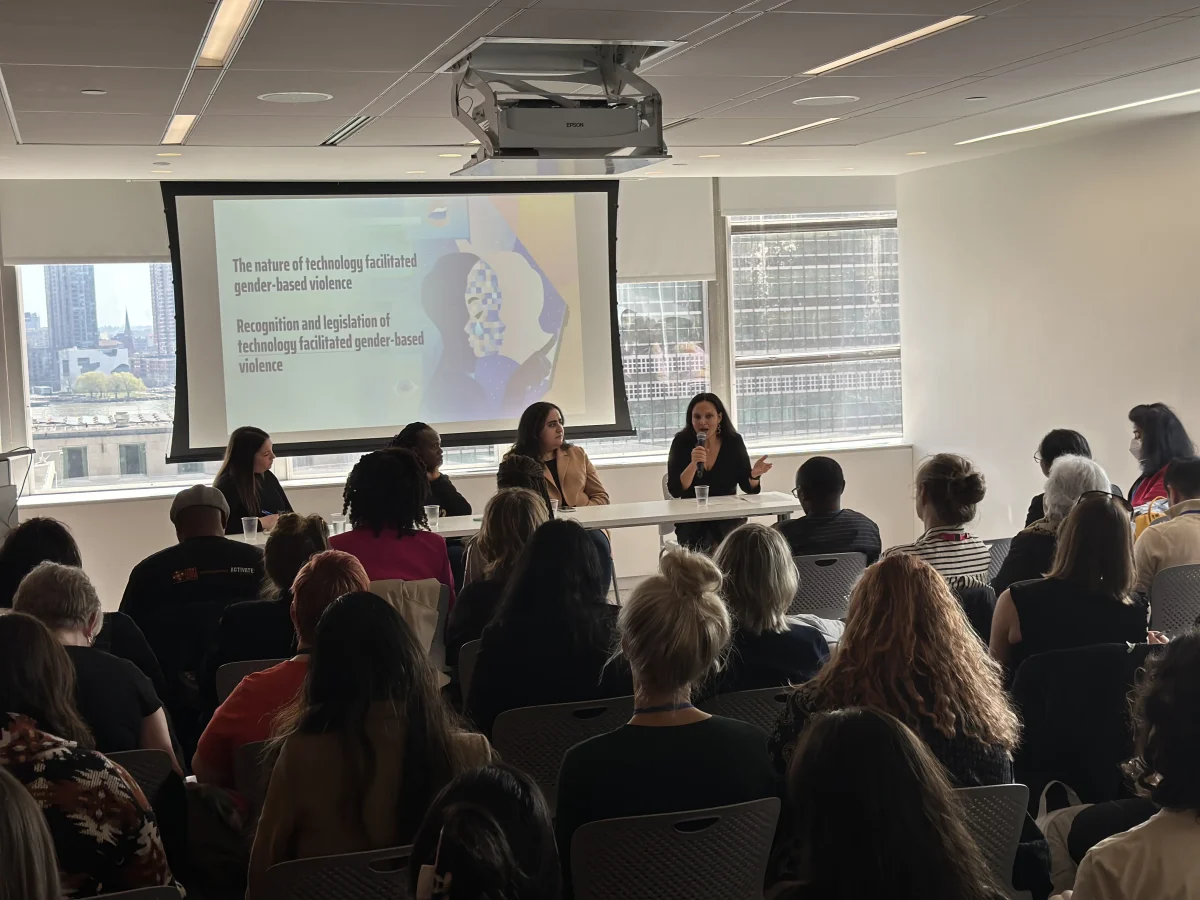The Generation Gender (GenG) programme has been conducting extensive research around the theme of TFGBV, which has resulted in a report titled Decoding Technology Facilitated Gender-Based Violence, a reality check from seven countries. This study, which will soon be made available to the public, offers a multi-country deep dive that aims at bridging the knowledge gaps that exist around TFGBV in different countries, including Lebanon, Morocco, Rwanda, South Africa, Indonesia, and many others
Technology-facilitated gender-based violence is a growing concern nowadays. With the rise of technology, the use of social media and other digital platforms has become a common means of communication for people all around the world. However, along with the benefits of these technologies come the risks of being exposed to violence, especially gender-based violence. To confront this alarming trend head-on, ABAAD, Equimundo, Rutgers, and Sonke from the Generation G partnership organised an event during this year’s CSW titled ‘Is Technology-Facilitated Gender-Based Violence Real?
The use of technology has made it easier for perpetrators to commit gender-based violence. Social media platforms, for instance, have become a place where people can easily harass, stalk, or intimidate others, especially women and members of the LGBTQ+ community.
To kick off the session at CSW68, Nina Jane Patel, co-founder, and President of Research & Safety at Kabuni, started off with her insights and own personal experiences with the reality of online violence and challenged the notion that TFGBV isn’t real.
“I realized that I could not underestimate the power of this new technology in our lives. This experience was traumatic, it was violent, and it wasn’t real. Following the public account of my experience, the backlash I received, which included threats and insults, was also very real and very frightening”, Nina Jane Patel, shared during the session.
“We must actively work against the damage that is being done and build a more inclusive and safer online environment. Today, right now, this moment, it is our turn, you and me, to collaborate, to learn from each other, and to act”, she added.

The prevalence of technology-facilitated gender-based violence is alarming. Studies have shown that women and girls are at a higher risk of being targeted online than men. This type of violence can take many forms, including cyberstalking, revenge porn, and online harassment. Moreover, technology-facilitated gender-based violence can have devastating effects on the victim’s mental health, self-esteem, and overall well-being.
The side-event was also interactive and educational where participants responded to poll quizzes to check the understanding of TFGBV. The delegates also explored legislations that are already in existence in some countries in some spaces, but unfortunately gaps remain. It was noted that the reporting mechanisms have limited effectiveness since reporting is often a disadvantage for the survivors, so it’s underreported, and even when it is reported, unfortunately, follow-up actions are not taken. Abishiag (AbiAbishiag(Abi) Wabwire, project coordinator at the Uganda Association of Women Lawyers (FIDA-U), also shared that Uganda is one of the few countries in Africa that has a law that can be used to try and curb TFGBV, as the women and girls are facing in Uganda. It was enacted in 2010 and amended last year. Unfortunately, the spirit behind this amendment was not to protect women, men, or anybody who is suffering from TFGBV. ‘’Unfortunately, the spirit of this legislation was not to safeguard women, men, or anybody suffering from TFGBV. The law is more to protect political leaders from the backlash they are facing online, not the victims, ‘’ she said.
During the session, Abi shared some eye-opening examples of women and girls in Uganda who have been victims of TFGBV, or Technology-Facilitated Gender-Based Violence. She highlighted how the legal system has failed these women, leaving them with little to no redressal.
Abi’s examples were both heart-wrenching and infuriating. She spoke of women who had faced online harassment, stalking, and even revenge porn. These women had approached the legal system for help, only to be met with apathy and a lack of understanding. The police, lawyers, and judges they turned to were often ill-equipped to deal with such cases. Some even dismissed the women’s complaints, and blamed them for taking half-naked pictures, although it was shared without their consent.
Abi’s discussion highlighted the systemic failures that perpetuate TFGBV. She emphasized the need for better legal frameworks and training for law enforcement officials. She also stressed the importance of creating safe spaces for women to speak out and seek help without fear of judgment or retaliation.
This side event underscored the urgent need for a more comprehensive and empathetic approach to tackling TFGBV. As a society, we must work towards creating a culture that values and protects the rights of women, both online and offline. Only then can we hope to eliminate the scourge of TFGBV and ensure that no woman is left to suffer in silence.

